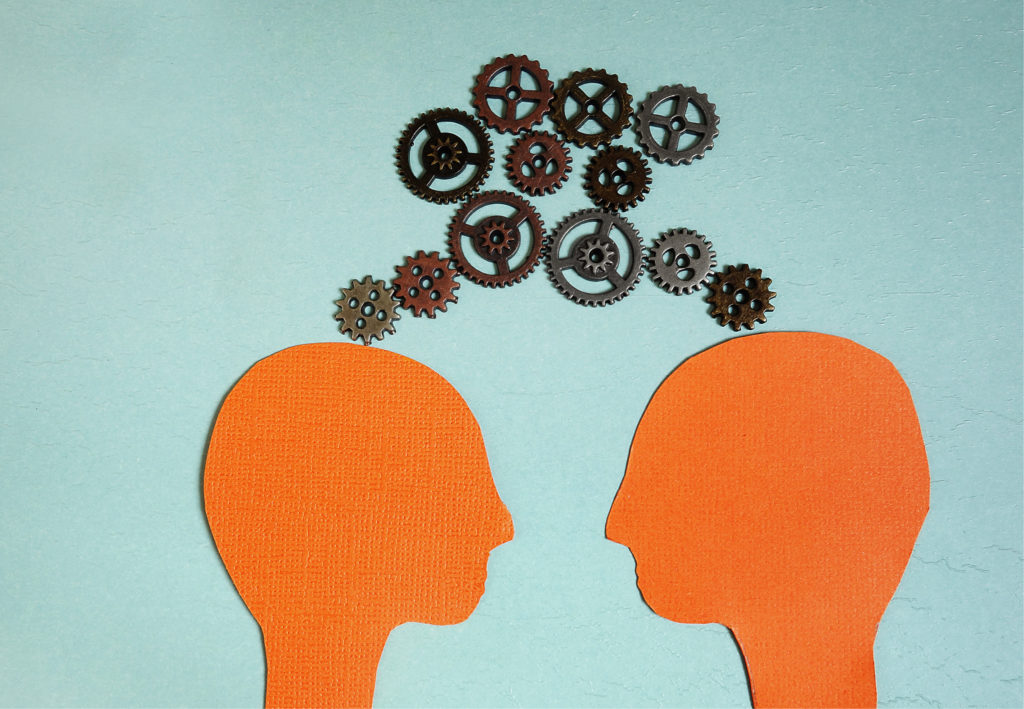Quick Hits
Daily brief research updates from the cognitive sciences

In case you didn’t know it brain synchronisation (or inter-brain synchronisation) is a thing. And a pretty cool thing. This happens when two, or more, people do similar things together and their brains sync up meaning that the firing patterns become very similar to each other.
This means that that feeling of being on the same wavelength is a feeling for the very good reason that you actually are on the same wavelength. I have written in more detail about this effect, which is important, because it also predicts many things. For example, when solving business types of tasks, brain synchronisation predicts how effectively a team will operate together. And also, how well they solve problems together. Similarly in audiences at concerts brain synchronisation predicts how well they enjoy it.
We could assume that this is related to how similar we are – with similar experiences and attitudes we are most likely to have brain synchronisation, but this piece of research shows that babies and adults playing together also show strong brain synchronisation.
Researchers at Princeton University set up the first experiment of this kind. It must be noted that measuring inter-brain synchrony is hard at the best of times due to its complexities i.e. measuring multiple brains and matching timing precisely. They managed by recruiting 42 children and using a technology called functional near-infrared spectroscopy (fNIRS) which measure blood flow similar to those pretty scans we often see.
However, 18 were too fidgety to give good readings and 3 flat out refused to wear the cap for measurement. That left 18 recordings.
Of interest is that in this study the same adult played with each child. Each child engaged in two scenarios: one playing with the adult, and another interacting with a parent while the other adult spoke to another person.
While the adult and child were playing brain synchronisation ramped up showing that similar processes were happening in their brains despite the large differences in age.
So, there you have it: parents when you play with your children you are getting on the same wavelength, and I am sure that is good for you.
For you business folk this is not just a random study, because inter-brain synchronisation is important for high performance in teams in business.
Here’s to syncing up!

Andy Habermacher
Andy is author of leading brains Review, Neuroleadership, and multiple other books. He has been intensively involved in writing and research into neuroleadership and is considered one of Europe’s leading experts. He is also a well-known public speaker speaking on the brain and human behaviour.
Andy is also a masters athlete (middle distance running) and competes regularly at international competitions (and holds a few national records in his age category).
Reference
Elise A. Piazza, Liat Hasenfratz, Uri Hasson, Casey Lew-Williams.
Infant and Adult Brains Are Coupled to the Dynamics of Natural Communication.
Psychological Science, 2019; 095679761987869
DOI: 10.1177/0956797619878698
More Quick Hits
The Truth of “Work Hard, Play Hard”
Quick HitsDaily brief research updates from the cognitive sciences e all know the phrase “work hard, play hard” and this drew my attention when I stumbled across some research actually looking into this - and whether this is a good thing or bad...
Coffee Makes Business Teams More Effective
Quick HitsDaily brief research updates from the cognitive sciences just couldn’t resist reviewing this piece of research, from a few years ago, after I stumbled across this (likely because some background algorithm had recommended it to me based...
Caffeine Makes You More Prone to Impulsive Buying
Quick HitsDaily brief research updates from the cognitive sciences fascinating piece of research just published shows that drinking coffee makes you more impulsive. That means you are likely to buy more, and more items you actually don’t need....
Healthy Brains Are Hotter Than You Think
Quick HitsDaily brief research updates from the cognitive sciences hen we get sick we get a fever and we all know what our body temperature should be: around 37°C. Too much above that and we have a fever, and too much below and we risk...
Unpredictable Parents Disrupt Brain Circuitry in Children
Quick HitsDaily brief research updates from the cognitive sciences ntuitively we all know that good parenting is essential to kids’ healthy development. We all agree on that. But as soon as we try to define what good parenting is we then enter into...
Unique Social Genes in Human Beings
Quick HitsDaily brief research updates from the cognitive sciences ne differentiating factor with human beings is our pro-sociality. This means we are a social species, and this sociality is seen in our ability to empathise, be socially tolerant,...






